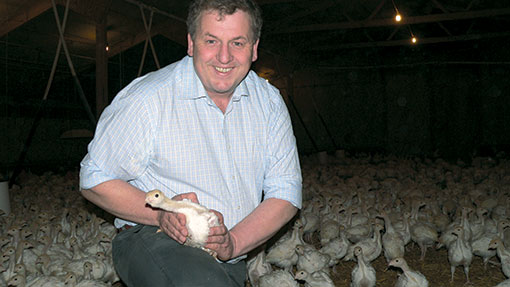Award-winning turkey producer sets the pace

One striking thing about William Grove Smith’s farm is the short distance from where the wheat is grown to where the boxed-up turkeys are dispatched.
Between the two are rearing sheds, grain stores and the processing plant. It’s this traceability and short supply chain that Mr Grove Smith feels is the key selling point for his business. “Plough to plate” is his catchphrase and is something he is clearly proud of. “What we’re really trying to do is control all the resources.”
The farm, near Braintree, Essex, first reared a “few turkeys for Christmas” about 50 years ago, Today there are 30,000 free-range hen turkeys grown for the seasonal market – 90% of them barn reared and 10% free-range bronze birds. The Christmas birds are individually boxed, branded “English Rose” and sold with a thermometer and a recipe book, plus a sprig of thyme. The quality of the meat has seen the company win numerous awards, including the Best Christmas Premium category at last year’s British Turkey Awards.
On the farm
The farm’s 250ha grows enough wheat to meet the turkeys’ year-round feed requirements, and also produces oilseed rape for straw and supplements for day-old birds’ diets.
The wheat is sent to Crown milling for processing into feed, with soya meal added – protein being one of the few inputs not possible to source on farm. “We tried growing some peas, but it didn’t really work out,” says Mr Grove Smith. The turkey manure is returned to the fields, creating an “organic circle,” he adds.
Farm facts
- 600 acres arable, growing wheat and oilseed rape .
- 30,000 free-range hens grown for Christmas.
- 1,500 a week stags turkeys processed each week
- Control of supply from “plough to plate”
There is also a “virtuous circle” when it comes to staffing. Keeping turkeys alongside an arable operation means the farm has a regular staff of around 20, and those that work on the harvest and drilling will turn themselves to the processing plant during the busy Christmas period. It is a happy coincidence that staff who are handy with a tractor engine can also be turned quite quickly to the maintenance of processing machinery, giving them year-round work on the farm.
Good start
Turkey poults spend their first five-to-six weeks in rearing sheds before being moved to finishing barns on other farms – some owned, some on contract.
While the Christmas hens are grown to between 20 and 24 weeks, it’s the first 10 days that are the most crucial for a good-quality end product. “During that period we walk the birds and replace feed and water every two hours,” explains Mr Grove Smith.
“Turkeys are very localised birds. They will rarely stray more than a metre in their first few days, and will always go back to the same drinker and feeder. It’s crucial that every feed pan has a good amount of clean food available, and that water is fresh and well supplied.”
Another key point for the early stages is getting bone strength right. “We don’t push growth rates too fast during the first 10 weeks,” says Mr Grove Smith. That attention to skeletal health pays dividends as the birds put on weight later in their lives.
While in rear, the birds are kept on a 12-hour daylight cycle, while keeping the sheds a little cooler than is conventional encourages them to take food and water on.
Once at slaughterweight, the birds return to the processing plant on the home farm. This has seen significant investment over the last 20 years, and has now won British Retail Consortium accreditation, something Mr Grove Smith says is crucial when taking turkeys to market with larger customers.
Year-round business
It’s not all about seasonal production at Grove Smith Turkeys. A minor “explosion” in consumption, caused by the emergence of carvery pubs in the 1980s, convinced the Grove Smiths to venture into year-round turkey production, too.
Today, about 1,500 conventionally-reared stags are slaughtered every week.
Consumers and the food service sector are increasingly demanding a prepared, convenient and ready-to-cook product, and today’s offering from Grove Smith Turkeys reflects this change; birds are sold as whole, saddles and crowns, kebabs and escallops. Dark meat finds an even wider range of added value outlets, while whole oven-ready birds are also sent to Smithfield Market.
“As the big companies are getting bigger, and seasonal farmers are doing their thing, our offering becomes unique,” says Mr Grove Smith.
He feels that there is a place in the market for medium, integrated operators, able to meet orders with a quick turnaround. He sees a bright future in turkeymeat, calling it a “superfood” for its high protein and low fat content.
The solution to low consumption outside the Christmas period is offering turkey in as wide a range of products as possible, using the entire bird. This is something Grove Smith Turkeys is striving for.
